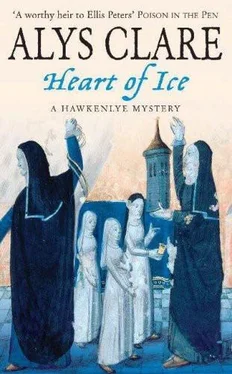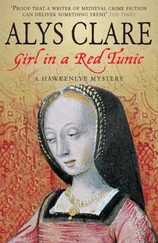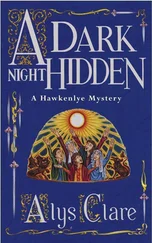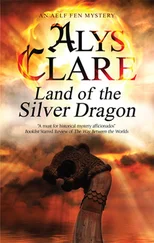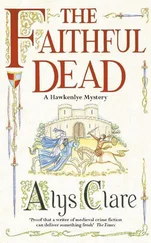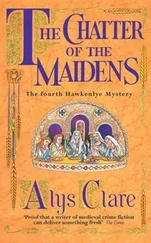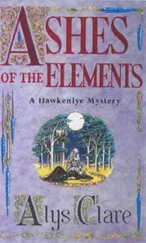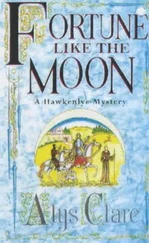Alys Clare - Heart of Ice
Здесь есть возможность читать онлайн «Alys Clare - Heart of Ice» весь текст электронной книги совершенно бесплатно (целиком полную версию без сокращений). В некоторых случаях можно слушать аудио, скачать через торрент в формате fb2 и присутствует краткое содержание. Год выпуска: 2007, Издательство: Hachette Littlehampton, Жанр: Исторический детектив, на английском языке. Описание произведения, (предисловие) а так же отзывы посетителей доступны на портале библиотеки ЛибКат.
- Название:Heart of Ice
- Автор:
- Издательство:Hachette Littlehampton
- Жанр:
- Год:2007
- ISBN:нет данных
- Рейтинг книги:4 / 5. Голосов: 1
-
Избранное:Добавить в избранное
- Отзывы:
-
Ваша оценка:
- 80
- 1
- 2
- 3
- 4
- 5
Heart of Ice: краткое содержание, описание и аннотация
Предлагаем к чтению аннотацию, описание, краткое содержание или предисловие (зависит от того, что написал сам автор книги «Heart of Ice»). Если вы не нашли необходимую информацию о книге — напишите в комментариях, мы постараемся отыскать её.
Heart of Ice — читать онлайн бесплатно полную книгу (весь текст) целиком
Ниже представлен текст книги, разбитый по страницам. Система сохранения места последней прочитанной страницы, позволяет с удобством читать онлайн бесплатно книгу «Heart of Ice», без необходимости каждый раз заново искать на чём Вы остановились. Поставьте закладку, и сможете в любой момент перейти на страницу, на которой закончили чтение.
Интервал:
Закладка:
Helewise prepared the words that she would say. It is God’s will, even though we cannot understand his great purpose. The child is innocent and will surely spend minimal time in purgatory, especially if we all pray as hard as we can for his soul. One day the two of you will be reunited in heaven, with your wife and the baby girl too.
All of which, in the face of the thatcher’s vast grief, would be next to useless.
The boy gave a long groan. His father fell like a stone to the lad’s side, crying his name and muttering incoherently, calling out to the boy not to leave him.
The lad opened his eyes, tried to sit up, gave a stifled cry of pain, then dropped back and lay still.
Helewise knelt beside the thatcher, her hand already searching for his; if nothing else, at least she could show him that she was there with him, aware of his terrible agony and ready to help him through it.
‘He is out of his pain now,’ she began, ‘he-’
But that was not right. Could not be right, for, her eyes on the boy, she saw that he was breathing, softly and deeply.
Darting up, she put her hands to him, on his forehead, on his chest. The heat was gone and the sweat had cooled on his skin. The tension had left the young face, replaced by the natural look of utter relaxation.
Pip was fast asleep.
Helewise felt joy surge through her and in that sublime moment sent her thanks up to the God who had understood a father’s desperation and answered his prayer. She put her hands on the thatcher’s shaking shoulders — he had buried his face in his hands to weep — and, bending down to speak in his ear, she said, ‘Get up, Catt, and have a look.’
‘I don’t want to-’ he began, but then something in her tone must have penetrated his grief, for he removed his hands, looked up at her and then, obeying her command, stood up and stared down at his son.
A sound broke from him, a sound of such unique quality that Helewise never heard the like again. Then the thatcher lowered himself on to his son’s bed and, with the infinitely tender touch of a mother intent on not waking her baby, he picked up one of the boy’s hands and pressed it to his face. Weeping still, but now from relief, he whispered, ‘Pip, oh, my Pip.’
Helewise, tears in her own eyes, crept away.
Chapter 17
In the morning a young monk sought out Josse and announced that a messenger had come to speak to him. On being asked who the messenger had come from and where he was, the lad said he didn’t know and outside the main gate.
Having fleshed out the admirably brief response, Josse wiped his hands — he was still engaged in the water-carrying task — and made his way up to the front gate of the Abbey. The messenger had the good sense to stand a short distance off — probably, Josse reflected, everybody in the county now knew that there was sickness at Hawkenlye — but nevertheless Josse recognised him. He was one of Gervase de Gifford’s men and his name. . Josse struggled to recall. . was Matt.
‘Good day to you, Matt,’ he called out.
Matt nodded. ‘Good day, Sir Josse. I won’t come closer, if it’s all the same to you.’
‘No, please don’t. What can I do for you?’
‘Not for me. It’s the sheriff as wants to see you,’ Matt replied.
‘Very well. I will make my way down to Tonbridge as soon as possible.’
‘Not the town,’ Matt said. ‘He says to meet at the top of Castle Hill. Safer.’
Matt had always been a man of few words, Josse remembered. ‘I admire his sense,’ he said. ‘I’ll set out for Castle Hill as soon as I get my horse saddled.’
Matt nodded again. ‘I’ll fetch Sheriff, then.’ Without another word, he turned his horse and rode off.
It was not long before Josse too was setting out from the Abbey along the track towards the turning down to Tonbridge. He was intensely curious as to why de Gifford wanted to see him. So great had been his involvement in the monumental struggle going on at Hawkenlye that he had had to remind himself of what had happened last time he and the sheriff had been together. For a moment, he was struck by the triviality of those earlier preoccupations; set against the huge shadow of the foreign pestilence, they seemed to be of little significance.
But a young man died, he reminded himself; Nicol Romley was struck down right there in our Vale. And the merchant in Hastings — Martin Kelsey — he was dead, too. No; those matters were far from trivial, and Josse knew he owed de Gifford all the help he could give him.
Gervase was waiting for him at the place where the track bent down across the face of the hill towards Tonbridge. He held up a hand as Josse approached; like Matt, he wanted to keep distance between himself and Josse.
‘I will come no nearer, don’t worry,’ Josse called out.
‘How stand things at the Abbey?’ de Gifford asked.
Josse shook his head. ‘More than twenty sick; many dead or near it.’
‘I see.’ De Gifford bowed his head for a moment. Then, raising his eyes, he said, ‘I have news for you.’
‘Concerning Nicol Romley?’
‘Yes. Somebody has been asking about him.’
‘Who?’
‘I do not know her true identity, although I can guess it. She is lodged with Goody Anne, where she gave her name as Matilda Hedley. However, not only does Anne report that the young lady speaks with an accent; Anne also heard her addressing the old man who is with her in what Anne described as some peculiar foreign tongue. She — Goody Anne — is now in an agony of indecision because, although she’s very pleased to have the business, she suspects that her two guests have come over from France and she’s terrified they may have brought the pestilence.’
Josse found that he was not all that affected by two people who might at some future date succumb to the sickness when he had recent first-hand experience of the poor souls who already had. He shrugged. ‘It is possible.’ Then, returning to the main concern: ‘You think that the foreign tongue suggests this woman is Sabin de Retz?’
‘Undoubtedly,’ de Gifford confirmed. ‘She asked to speak to the sheriff and I went to see her. She did not give any name to me, true or false; she merely asked if it was true that Nicol Romley had been murdered. I said it was and she asked for the details, which I gave her.’
‘How did she react?’
‘She already knew he was dead, Josse, so there was no sudden outpouring of grief. However, I glean from her demeanour that she was fond of the lad. Very fond, I should say.’ He sniffed.
Josse was thinking. ‘Gervase, she did not know of Nicol’s death until she reached England. Her mission here was, I suggest, to find him and warn him that he was in danger, only she was too late. His killer had already arrived, found the poor lad and murdered him. Also,’ he added excitedly, struck by another fact, ‘she gave her real name to Sister Ursel at Hawkenlye yet she is now travelling under an alias, which suggests to me that something has happened — such as discovering that Nicol has been murdered — to make her sufficiently afraid to disguise her identity.’
‘Yes, you are right,’ de Gifford said. ‘There would be no point in a mission to warn someone if one knew they were already beyond help. But, knowing he is dead, why should she come here, unless perhaps she has such feelings for him that she would see his killer brought to justice?’ He frowned, as if the thought displeased him. Then he said abruptly, ‘Who told her Nicol was dead?’
‘Not Adam Morton, for when he sent Sabin on to Hawkenlye, he thought Nicol was still alive, although sick. Not Sister Ursel, for I have asked the sister and she confirmed that she did not think it appropriate to speak of such a thing while standing at the Abbey gate.’ Josse frowned, thinking hard. Then he said, ‘My guess is that she was at Robertsbridge, although she had persuaded the monk who received Gus and me there not to tell anyone. Perhaps she overheard me tell Stephen — the monk — that Nicol had been murdered. Perhaps Stephen told her.’
Читать дальшеИнтервал:
Закладка:
Похожие книги на «Heart of Ice»
Представляем Вашему вниманию похожие книги на «Heart of Ice» списком для выбора. Мы отобрали схожую по названию и смыслу литературу в надежде предоставить читателям больше вариантов отыскать новые, интересные, ещё непрочитанные произведения.
Обсуждение, отзывы о книге «Heart of Ice» и просто собственные мнения читателей. Оставьте ваши комментарии, напишите, что Вы думаете о произведении, его смысле или главных героях. Укажите что конкретно понравилось, а что нет, и почему Вы так считаете.
